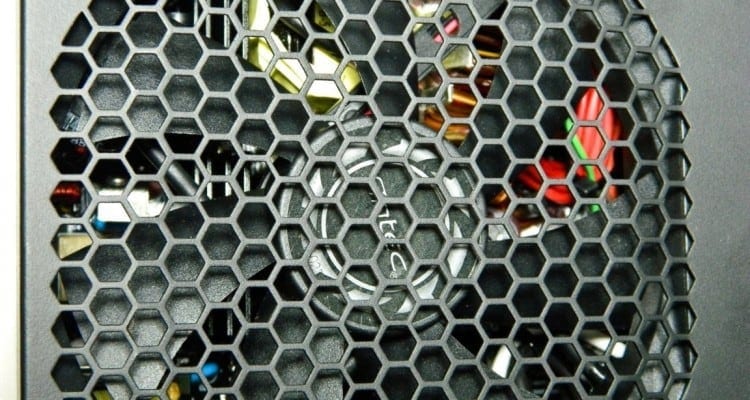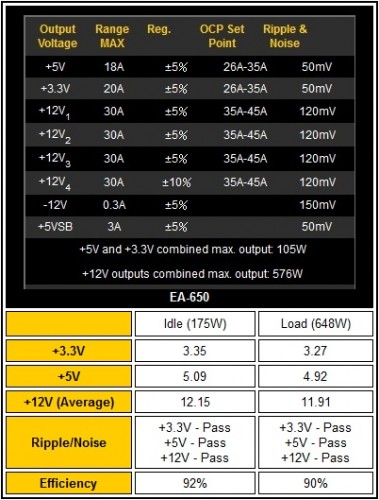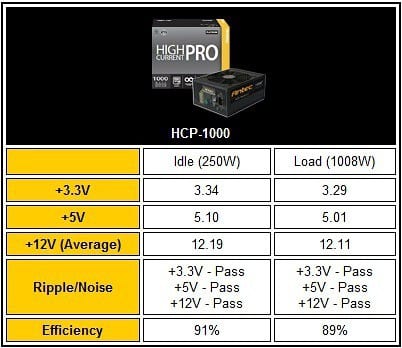Antec EA-650 – Voltage, Efficiency and Max Load Performance
The rails were monitored while performing regular operations running back to back benchmarks keeping an eye on fluctuations and efficiency. Then, the PSU was artificially loaded down to see where it maxed out while again controlling the load. Here’s what we found out about the EA-650.
In terms of efficiency, the main power plant components ensure that efficiency is up to Platinum standards. The loaded rails did drop a bit below their stock rated specs. While this looks like a negative, it’s still well above levels that would be cause for concern. Fortunately, the power plant does manage ripple relatively well keeping things pretty steady during rising and falling output.
The maximum output repeatedly produced by the EA-650 was 748 watts while still maintaining at least an 85% efficiency. Buying this PSU expecting to squeeze an extra 100 watts from it is not recommended though. This PSU would best suit users powering a 6-core processor and up to two GTX 560 Ti in SLI, as an example. What this does reveal is that the EA-650 isn’t flexing its heart out at its rated output so it will support your system properly while giving you every what you’ve paid for.
Antec HCP-1000 – Voltage, Efficiency and Max Load Performance
Like the EA-650, the rails of the HCP-1000 were monitored while performing regular operations running back to back benchmarks keeping an eye on fluctuations and efficiency. Then, the PSU was artificially loaded down to see where it maxed out while again controlling the load. Now let’s see how the HCP-1000 did!
The HCP-1000 handles the rated wattage perfectly. The numbers here are all well within the realm of great performance. You don’t have to worry about whether or not this PSU provides power within acceptable tolerances. Each rail was very stable with very little ripple no matter the power draw. In fact, it was very similar to the EA-650 which shows that the PFC controllers are doing their job.
Fan Noise Examined
The EA-650 Platinum isn’t too audible under 300 watts but starts to creep above 19dB all the way up to 36dB under load. This is pretty typical for a PSU used in a normal system. The reason for the loud fan may have something to do with the 4 x 2.25″ heat sink and those CapXon caps that need extra cooling. However, it unfortunately eliminates it as a possible model for system integrators who like lower noise components. This should be considered if you’re building a quiet system.
Naturally, the HCP-1000 is a much different animal and not quite a wolf. Its odd sized 135mm cooling fan is relatively quiet right up till about 700 watts at which point this PSU growls. It doesn’t go above 28dB or so depending on the wattage drawn. The air comes out the back so quickly that the it is just barely warm suggesting there’s room to slow this fan unit down. Till then, this unit won’t work in any silent systems either. For standard users and gamers, the HCP-1000 is right on the money though.
Final Thoughts – Antec Earthwatts Platinum 650 (EA-650)
The goal of the Antec EarthWatts Platinum is to step away from the conventional mainstream quality and offer power conscious users a very efficient, yet respectively affordable, option. While its power rails are well within tolerance, it would really have said “all platinum” if the voltages were closer to their perspective rails. Still, users can expect a full 650 watts while maintaining 89% efficiency. There’s even extra power underneath if you’re really against the wattage wall. It’s plenty strong enough to handle any system with a couple GTX 560 Ti with room a bit of room to spare.
The quality and design is good and the details seem to point to it being built by FSPGroup or Fortron who is known for making very reliable server power supplies. However, similar to those designs, the EarthWatts EA-650 power supply gets a bit loud under load. While it won’t appeal to silent system builders, it should satisfy regular users who want platinum computing value and less sticker shock on the electrical bill.
You can purchase the PSU for $100 to $119.99 US/CA depending on the retailer and it comes with a 3 year warranty.
Pros
- Affordable Platinum performance
- High quality components
- Clean braiding and heat shrink
- Reliable voltage rails
- Max output around 750 watts
Cons
- Cooling fan reaches 35+ dB under load
- Not for users who want modular cabling
Overall Rating: 8.0 / 10.0

Antec High Current Pro 1000 Watt Platinum (HCP-1000)
The Antec High Current Pro 1000 Watt Platinum is a very strong 1kW power supply that provides performance that feels more platinum than anything else. The power and voltages generated by this plant is impressive as well as its maximum output which exceeds specs by a good margin. It’s assembled with good quality components that seem to be meant for a higher wattage power supply yet it still maintains an 80 Plus efficiency throughout. SLI and CrossFireX users will find more than enough power to feed up to three (maybe four) of the fastest single GPU video cards out there.
Users can expect low fan noise levels right up to about 75% load before it starts to get louder. But it still doesn’t quite get loud enough to offend anyone and at those loads, chances are, the components in your system will be louder. Especially four monster single GPU video cards.
The HCP-1000 has been offered by a few system integrators which should hint to regular users that this is worth the $259.99 US/CA. After all, they need to provide support for those systems and it’s also good to know that you’re getting one of the longest warranties in the business at 7 years.
Unless someone brings us something far superior, this is the best 1kw PSU in our lab. It’s definitely an Editors’ Choice for us.
Pros
- Very solid voltage rail output
- Very low ripple and noise
- Max output about 1150 watts
- Platinum efficiency under load
- Strong cable fixtures
- 7 Year Warranty!
Cons
- May not fit in to more compact cases
Overall Rating: 9.0 / 10.0

Help Us Improve Our Reviews by Leaving a Comment Below!



